Brain Development in the Early Years: Let Music be the Spark
Why is Early Childhood Education important? Karl Heinrich Gottfried Witte, the father of Early Childhood Education in the 19th century, agreed with Claude Adrien Helvetius, the French thinker, who believed ‘Even an ordinary child, if taught properly, can become an extraordinary person.’ With the success of his daring experiment in the upbringing of his son, Witte overturned the prevailing ‘innate determinism’ and was the first to demonstrate empirically the importance of early education in child development. He believed that ‘The education of a child should begin with the dawning of the child’s intelligence. The educational period from birth to the age of five or six is crucial for the child's future development’.
While Early Childhood Education is the foundation and beginning of holistic education, Music Education is an inseparable part of Early Childhood Education. In his educational work Republic, the ancient Greek educator Plato emphasised that ‘education is based on music, and everyone must learn it’. As a great ancient Chinese thinker, politician and educator, Confucius also paid great attention to music education and he put Music in second place in the Six Arts (Rites, Music, Archery, Chariot Racing, Calligraphy and Mathematics) course he taught. He believed that ‘one cannot be a holistic man without learning music; music can bring people the inner harmony’.
What does the research tell us?
————
In modern times, on the topic of the influence of music education on children's brain development, many studies agree on the critical role music plays. It not only provides great opportunities where children can experience different musical emotions, cultivate their own emotions, and develop their musical knowledge and skills, but also promotes the development of child's body and mind, language, cognitive perception, intelligence, and creativity. In her article published in the International Journal of Music Education, Susan Hallam, the British educator, points out that many scientific studies on how musical skills influence the brain regions have recognised that; In early childhood, learning music is good for the development of perceptual skills which affect language learning, and which subsequently impact on literacy. Learning musical rhythms is also important for the acquisition of literacy skills. By learning to play the instrument, child can exercise the fingers and improve the fine motor coordination. When it provides positive learning experiences, the engagement of music activities can enhance self-perceptions. Therefore, early childhood music education is of great importance for child’s intelligence, personality, and health development. According to the research, music education brings many benefits to child’s language literacy, self-regulation, physical and mental health. Therefore, it is important that we place a strong emphasis on how we carry out early childhood music education.
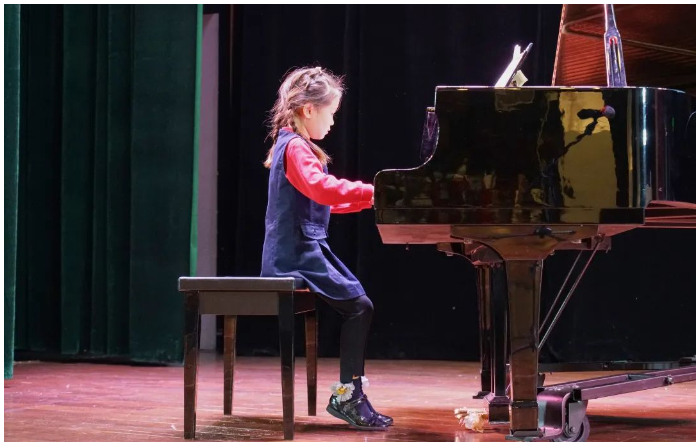
Three Styles of Music Education
————
There are three music education systems that are well known and widely used:
01 Dalcroze Eurhythmics, which encourages musical game-based rhythmic movements of the body, ear training and improvisations.
02 Kodaly Method, which advocates learning by singing which focuses on combining game, movement, performance and improvisation through the way of singing.
03 Orff Method, which focuses on the development of child’s inner world. Children will not take music learning as a burden. Instead, children will develop their personality, group awareness and team working spirit while having great fun from singing, percussion, games and group dance activities.
Each approach has its own advantages. No matter which approach is used, the purpose is the same; to create a positive and active musical environment where children can be engaged to enjoy and perceive music, develop musical literacy, and be able to put what they learn into practice in the later stages of music learning.
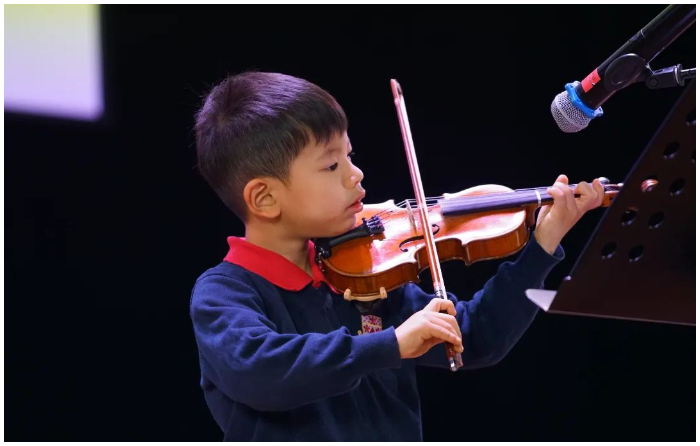
How We Approach Music Instruction at Dulwich College Shanghai Puxi
————
Do different music teaching approaches bring the same benefits for child development? Music teachers who are professionally trained can use various teaching approaches to carry out music activities. Early Years teachers can use music as a signal of activity connection or use media music to carry out group activities, which, to varying degrees, can bring child great music experience. At Dulwich College Shanghai Puxi, how do we design our research-based Early Years music program?
We start with the following six aims in mind:
1 Language and Communication Skills
In our DUCKS programme, from Toddler to Year 2, we use a Dual-Language approach to instruction. We choose both Chinese and English songs and nursery rhymes, as well as folk songs of other languages for different age groups, with the aim of fostering their sense of inclusiveness towards diverse cultures. Students develop their creative thinking in speech by singing nursery rhymes and songs, demonstrating high/low/strong/weak sounds, imitating animal cries and memorising lyrics through choreography. They develop their non-verbal communication skills by creating movements and lyrics while understanding the meaning of the song. They develop their listening habits and self-expression by using the language of music to communicate, creating and making music, mastering non-verbal commands, eye contact and markers to represents the sounds they make.
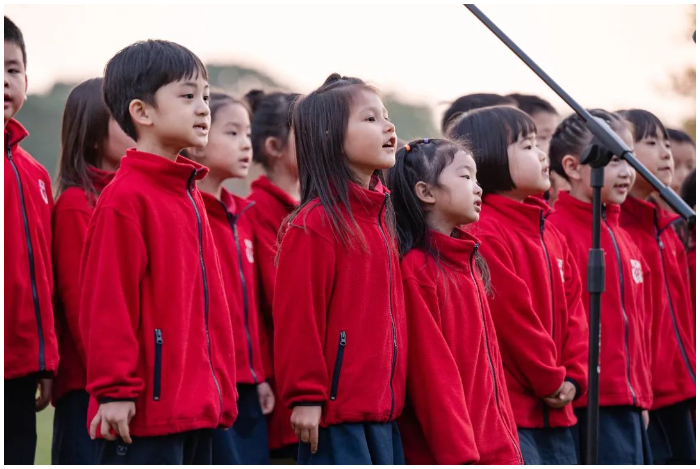
2 Physical Development
Students are encouraged to exercise and develop their fine motor skills and small muscles by actively participating in different musical activities, as well as develop their gross movement skills and physical coordination. For example, in the percussion class, students will learn to use the right posture to play the instrument; follow the music to control the tempo, speed and strength of the sound; start, continue and stop playing according to the music instructions. The development of big movement skills and body coordination is mainly reflected in imitating dance movements, small body movements and big body movements including running, jumping, swinging, turning in circles and so on.
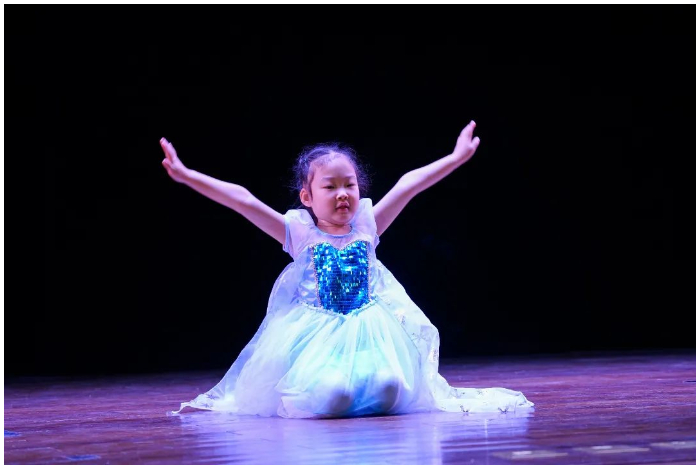
3 Personality, Social and Emotional Development
In music class, students can build positive self-awareness and awareness of others by playing music games and instruments, singing and sharing with others. Positive relationships and respect for others can also be developed by taking turns playing musical instruments and enjoying different forms of musical performance. Students learn to understand others’ emotions and express their own emotions by singing and learning songs and music stories that are related to emotional expression, to develop their social skills and emotional management ability. We respect every child's inner needs. We encourage them to express their ideas and preferences. Every child's voice will be heard, and we help them build confidence in the community.
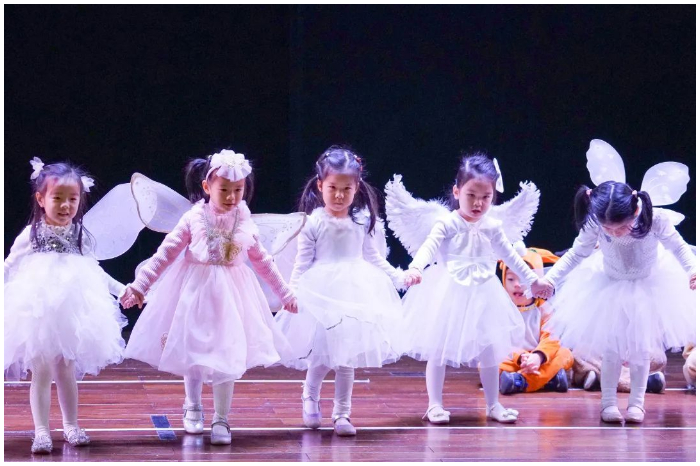
4 Literacy
We use voice mimicry and props to guide children to understand and learn narrative songs. Through innovative lyrics and phrases, children can explore the sounds of voices and instruments, thus stimulating their creativity and imagination.
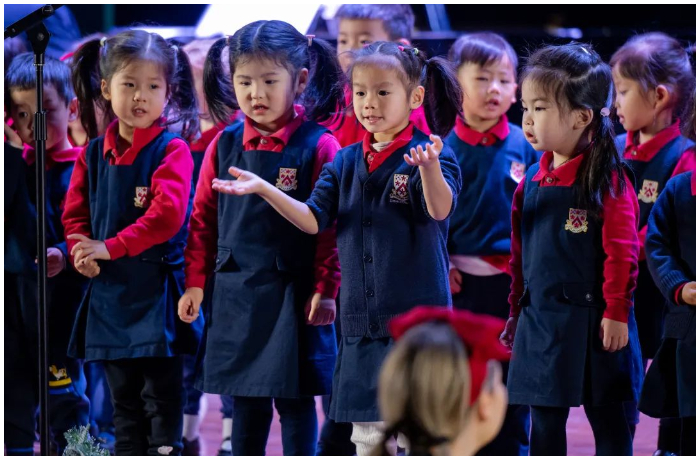
5 Numeracy
We use visual cards and various animal hand puppets to perform songs to help children quickly understand the meaning of numbers and the relationship between simple numbers under the dual effects of visual and auditory. Students can get a preliminary understanding of sequence, regularity, quantity and repetition during the process of learning percussions, and tapping for songs to create simple rhythms.
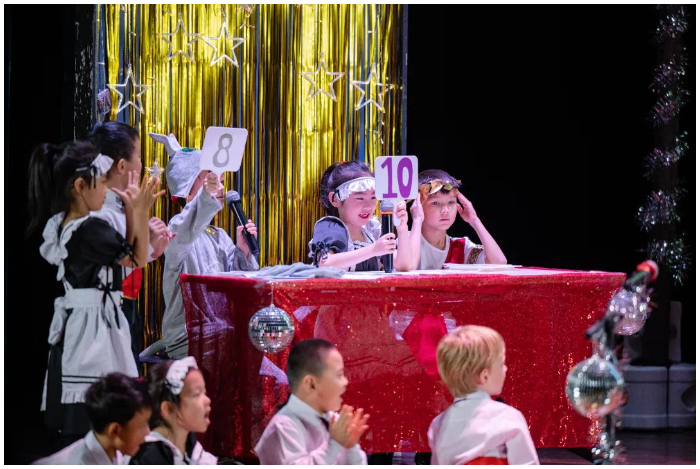
6 Perception Skills
By singing songs in different languages, especially Chinese songs as well as nursery rhymes in local languages, students can experience different cultures, identify their own culture, and enjoy the cultural environment that they are currently in. Students are stimulated to explore and understand how the world around them work by exploring different musical instruments.
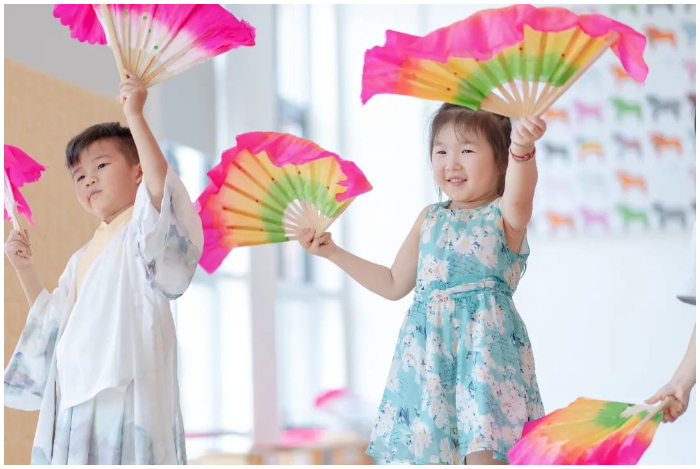
These six aims provide significant benefits for our younger students. Of course, in the long run, our Early Years music program aims to build a happy and engaging musical environment where our younger students can actively enjoy creating and participating in music. When they transition to primary school, they are well equipped with both the music knowledge, the skills, and the confidence required to take on more challenging tasks, such as joining the Junior Choir, the orchestra, the Primary Instrumental Programme music, one-to-one instrument instruction, and the many other musical and performance activities offered within and outside school.
We believe that every child should be brought up in an environment where they can create and enjoy. Music education needs to bring students joy, happiness, confidence and contentment. We know that music is important for children’s development. How a child experiences and learns music is important, but it's even more important that music should be fun and meaningful to the child. Some students enjoy gaining mastery through one-to-one instrument lessons, while others may just like to have fun with music. As music educators, we help students figure out which forms of music learning suit them best as individuals, through our knowledge of each unique child. We support them to find and follow their own musical path. Early Years music education is critical for children’s development, but we must always remember that in the first instance, learning music should be FUN!
References
“卡尔威特教育.” Max.book118.com,
max.book118.com/html/2019/0414/8056010005002017.shtm. Accessed 11 Apr. 2022.
“科学网-孔子对音乐的贡献.” News.sciencenet.cn,news.sciencenet.cn/sbhtmlnews/2007112017230193189.html.
“第四节 柏拉图的教育思想.” Jpkc.bnude.cn, jpkc.bnude.cn/wgjys/html/content/courseware/ch0204_2.html.
“幼儿早期音乐启蒙性格教育_中国网.” Music.china.com.cn, music.china.com.cn/2017-05/16/content_9483336.htm. Accessed 11 Apr. 2022.
Hallam, Susan. “The Power of Music: Its Impact on the Intellectual, Social and Personal Development of Children and Young People.” International Journal of Music Education, vol. 28, no. 3, Aug. 2010, pp. 269–289, 10.1177/0255761410370658.





